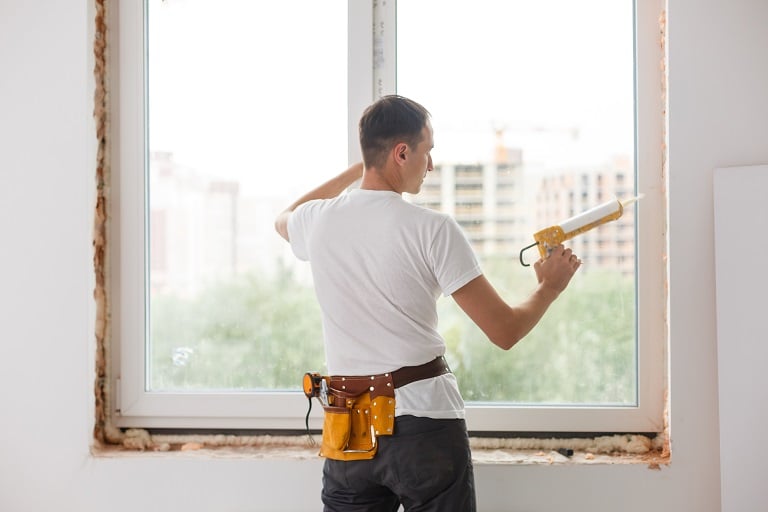
Building permits are essential. Here’s everything you need to know about building permit costs to budget accordingly for your building project.
Contractors are paid hourly and generally don’t expect a tip, but you can offer one if they go above and beyond


While everyone knows to tip at least 20% after dining in a restaurant or to leave a few bucks for the cleaning service after a hotel stay, other situations aren't nearly as clear-cut.
Hiring a contractor is one of those situations. Many people wonder if they should leave something extra for a professional who has come over to their house to fix a sink or repair the roof. But is it expected, and how much should I tip my contractor? Don’t worry, this guide will answer those questions and help you determine how much to tip hired pros.
When taking on this project, expect questions only a pro can answer. With our network of local pros, you'll get the job done and your questions answered—without the hassle and stress of doing it yourself.
Most contractors are paid hourly for their work, and they are often highly trained and typically fairly compensated for their skilled labor. As a result, tipping isn't a common practice in the industry.
Because contractors typically don’t expect tips, everything is usually included in the hourly rate in their quotes. Surveys show that just 6% of remodeling companies expect a tip, and just 7% of handypeople and painters. However, if you feel compelled to tip the pro extra, you should follow the guidelines below for best practices and amounts.
However, it's still OK to tip contractors when they go above and beyond to provide outstanding service, or even if you just feel like it. After all, these pros worked hard to complete your renovation or contracting project.
Consider giving your contractor an additional tip under these circumstances:
Large, multi-month job
Completed the job ahead of schedule
Worked through extreme weather conditions
Strenuous and difficult job
Provided additional services outside contract
Appreciation for their time and effort
If you’ve decided to leave a tip for your contractor, the next step is to decide how much is appropriate to tip. It’s a judgment call, but you don’t need to worry too much about being wrong because, once again, tips aren’t expected.
However, a strong tipping strategy is to tip between 10% to 20% of the contractor’s original job estimate. With that in mind, let’s review how much you should tip other types of pros you may work with during a contracting job.
Many people hire a local handyperson to complete a series of smaller jobs around the house, such as fixing a leaky sink or cleaning the gutters. If your handyperson provides exceptional service, it’s appropriate to tip them $10 to $20 per hour, depending on the job.
If you hire a local painter or a local interior designer to help revamp part of your home, you can tip them to show your appreciation for a job well done. While painters and decorators are paid hourly for their service, if you wish to leave a tip, consider adding 10% to 15% of the project cost.
Most professional plumbers and electricians charge a premium for their specialized services, and therefore, don’t typically expect customers to tip them on top of the job cost. For example, electricians charge rates of $50 to $100 per hour, and plumbers charge $180 to $480 per hour. In some cases, plumbers and electricians may not accept tips.
If you have an outstanding experience with your plumber or electrician and want to tip them for their services, consider adding 10% to 15% of the project cost.
The protocol for tipping a local landscaper depends on whether it’s a one-time job or a weekly or monthly service. If you hired a landscaping team for a one-off job, like installing a backyard water feature, consider tipping $10 to $20 per crew member. On the other hand, if you’re working with a landscaping or lawn service for regular maintenance, it’s appropriate to add an annual bonus of 10% to 20% to show appreciation for their ongoing service.
Like landscapers, the best way to tip a local house cleaner depends on the frequency of the service. For one-time, deep-clean jobs, consider tipping $10 to $20 per house cleaner. However, if you work with a house-cleaning service on a weekly or monthly basis, consider tipping 15% to 20% of the monthly rate.
Tips always don't have to be money. You can demonstrate your gratitude to workers by bringing them food or a cold beverage on a hot day. Or you can show kindness by doing simple things like letting the contractor use your bathroom. Often, that’s more than enough.
In addition to a tip (or instead of one) you should always consider leaving your contractor a positive online review if you’re impressed with their services. Leaving a detailed review can help drum up business for your contractor and could even be more beneficial than a tip. Your review will also help others in their search for general contractors near you.
If you want to go one step further, you can also offer to be a reference as a job well done. Still, if you can afford it, a monetary tip will likely be appreciated the most.

While tipping a specialized pro for their hard work may seem like a no-brainer, it’s important to ensure they can accept tips before making an attempt. For instance, you should be aware that some companies discourage their employees from receiving tips. That’s why pressuring a crew member into taking a tip might result in an uncomfortable situation or even get the employee in trouble if they ultimately accept the tip.
To avoid this type of situation, politely ask the worker if their employer allows tips before offering one, or ask the owner of the contracting company directly. That way, you can ensure tipping the pro is appropriate and avoid any potentially awkward situations.
From average costs to expert advice, get all the answers you need to get your job done.

Building permits are essential. Here’s everything you need to know about building permit costs to budget accordingly for your building project.

Going from an undeveloped plot to your dream home can be expensive. Learn about the cost to develop land and what factors can affect your total.

Brick walls can add character and elegance to interior and exterior spaces. Use this brick wall cost guide to see the price range for adding one to your home.

Ready to dive into that home reno but tight on funds? Learn all the different ways to finance home renovations to get your work underway and stay on budget.

Here's how much households are paying for utilities around the country. While location determines provider rates, your home's size and efficiency level can dramatically impact utility usage.

To make your home project stress-free, we’ve compiled a list of 12 questions to ask your contractor during every stage, from first contact to project wrap-up.